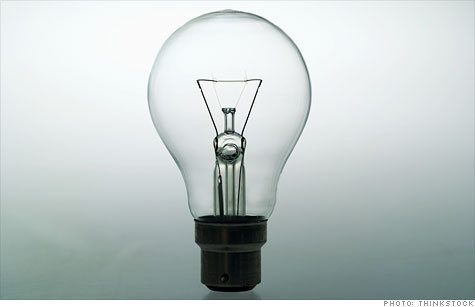
The push to keep traditional light bulbs on the shelves is gaining steam, driven by a distrust of government and global warming.
NEW YORK (CNNMoney) -- The so-called light bulb ban, set to begin in 2012, has become a rallying point for conservatives, libertarians, and various free-market activists who deride what they see as unnecessary government interference in the marketplace.
A bill calling for light bulbs to become gradually more efficient beginning in 2012 and ending in 2020 -- what critics are calling a ban -- passed in 2007 with bipartisan support and was signed into law by then-President George W. Bush.
Because of those higher standards, traditional bulbs will probably be phased out, to be replaced with more efficient incandescent bulbs, compact fluorescents and LEDs.
Republicans have been under considerable pressure to roll back those higher efficiency standards, though the House on Tuesday failed to pass a measure that would have done just that.
"The government has taken upon itself to decide what people should buy," said Myron Ebell, head of Freedom Action, an activist group he described as "hardcore free market."
Ebell's group has been circulating a petition online that he said has garnered tens of thousands of signatures. Many of those who've signed have written their legislators urging an end to the ban.
The cause has other champions as well, including Republican presidential candidate Michele Bachmann and radio show host Glenn Beck.
Supporters of maintaining higher efficiency standards have been touting the economic benefits.
Even though fluorescent light bulbs cost about five times more than incandescents, Americans would save a total of $12 billion a year by 2020 if the standards are left in place due to lower electricity bills, said the Natural Resources Defense Council.
That works out to $85 per year for every household.
But what really motivated the higher standards to begin with was a desire to save energy and cut pollution. NRDC estimates the standards would eliminate the need to build 33 coal-fired power plants by 2020, when the standards are fully in effect.
"Clearly, consumers, the economy and the environment will suffer if these standards are repealed," said Jim Presswood, NRDC's federal energy policy director.
NRDC noted that incandescent light bulbs will still be available after the standards go into effect, just ones that are more efficient (and more expensive).
Other alternatives will also be available, including LED bulbs and compact fluorescents.
Concerns about the mercury in compact fluorescent bulbs have led some to rail against the higher standards. Mercury is a toxic substance that's been linked to developmental problems in children.
NRDC said that it is working with light bulb manufacturers to lower the amount of mercury that goes into the bulbs. Plus, the amount of mercury levels is tiny compared to the amount emitted by coal-fired power plants to power inefficient incandescent bulbs.
But for critics it's all about choice. If people want to save money over the long run by buying a fluorescent light bulb, that's fine -- they just don't want the government to force people to do it.
When it comes to reducing pollution, critics say cutting down on pollutants like sulfur dioxide that cause acid rain or asthma is a worthy cause. But they argue that going after carbon dioxide, the greenhouse gas that scientists believe causes global warming, is a waste of time.
Most of those who want to overturn the ban do not believe in global warming, despite the consensus among the scientific community.
"The evidence that the earth is warming up just isn't there," said Ebell. "It can't possibly be a crisis." ![]()
| Overnight Avg Rate | Latest | Change | Last Week |
|---|---|---|---|
| 30 yr fixed | 3.80% | 3.88% | |
| 15 yr fixed | 3.20% | 3.23% | |
| 5/1 ARM | 3.84% | 3.88% | |
| 30 yr refi | 3.82% | 3.93% | |
| 15 yr refi | 3.20% | 3.23% |
Today's featured rates:
| Latest Report | Next Update |
|---|---|
| Home prices | Aug 28 |
| Consumer confidence | Aug 28 |
| GDP | Aug 29 |
| Manufacturing (ISM) | Sept 4 |
| Jobs | Sept 7 |
| Inflation (CPI) | Sept 14 |
| Retail sales | Sept 14 |